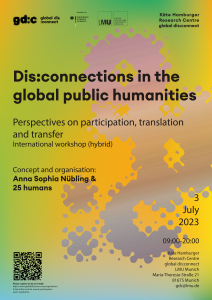3 July, Dis:connections in the global public humanities, perspectives on participation, translation and transfer
 Interest in science communication and transfer is growing. This workshop attempts to negotiate challenges and opportunities in thinking through public humanities, including digital humanities, on a global scale.
Interest in science communication and transfer is growing. This workshop attempts to negotiate challenges and opportunities in thinking through public humanities, including digital humanities, on a global scale.
09:00-18:00: Workshop
In the first panel, we discuss what challenges the humanities currently face, interrogating what the humanities are and could be for from a global perspective. Such a perspective not only challenges the idea of the humanities as a European concept, but also forces us to think about what constitutes a public and/or community, and what the existence of various (global) publics and communities means for the idea of public humanities, its communication and transfer. The panel also addresses how we can develop a language capable of translating not only between different scholarly disciplines but also between different publics.
The second panel asks how the humanities relate to the omnicrises of the present. How do, can and should the humanities participate in identifying, naming, discussing, combatting or otherwise relating to these crises? How can the quality of the humanities infuse publics and with which tools?
The third panel addresses the challenges and possibilities of digital tools for the global public humanities. How can they help overcome, alleviate and negotiate the challenges of the global humanities? How do digital humanities help us connect more globally, and how does its required infrastructure hinder inclusivity?
The workshop closes with a panel on perspectives ‘from below’. As the workshop is co-organised by a network of junior scholars, whose aim is to strengthen the humanities’ perspective in society, we are especially interested in the role of junior scholars in practicing and representing global public humanities. How can their perspectives on the problems and potentials of the humanities be best integrated into a larger conversation, thereby accounting for the different positionalities of junior scholars in the global North and South? This panel also lets participants share their experiences of what practical challenges arise from the particular perspective of a career in the humanities and how they can overcome.
Speakers:
Eva-Maria Bergdolt (CAPAS Heidelberg), Canan Hastik (TU Darmstadt), Sarah Dillon (Cambridge University), Premesh Lalu (University of Western Cape), Martin Puchner (former fellow at Käte Hamburger Research Centre global dis:connect, LMU Munich; Harvard University), Gimena del Rio Riande (University of Buenos Aires), Lwando Scott (University of Western Cape), Inéz-Maria Wellner (VolkswagenStiftung/25humans)
18:30-20:00 Conversation (open to the public): Thinking the global, thinking the public: Public humanities and the world
How do we think the public humanities globally – what is a global perspective on the public humanities? We share senses of what it means to do humanities but all practice humanities work under local conditions. What, if anything, translates between these contexts? Is there a sense in which the public humanities can be “global”?
We discuss these questions, and others related to the public humanities, with Roland Wenzlhuemer (global dis:connect), Sarah Dillon (Cambridge), and an open hot-seat for everybody to join us on stage.
Participants:
Sarah Dillon (Cambridge University), Roland Wenzlhuemer (Käte Hamburger Research Centre global dis:connect, LMU Munich), the audience (everyone is invited to join the conversation).
Chair:
Tim Lanzendörfer (Goethe University Frankfurt)
Organisers:
Anna Sophia Nübling (former postdoctoral researcher at Käte Hamburger Research Centre global dis:connect, LMU Munich) & 25humans
Venue:
Käte Hamburger Research Centre global dis:connect Maria-Theresia-Str. 21 81675 Munich
Please register by 28 June HERE.
To download the programme click HERE.





